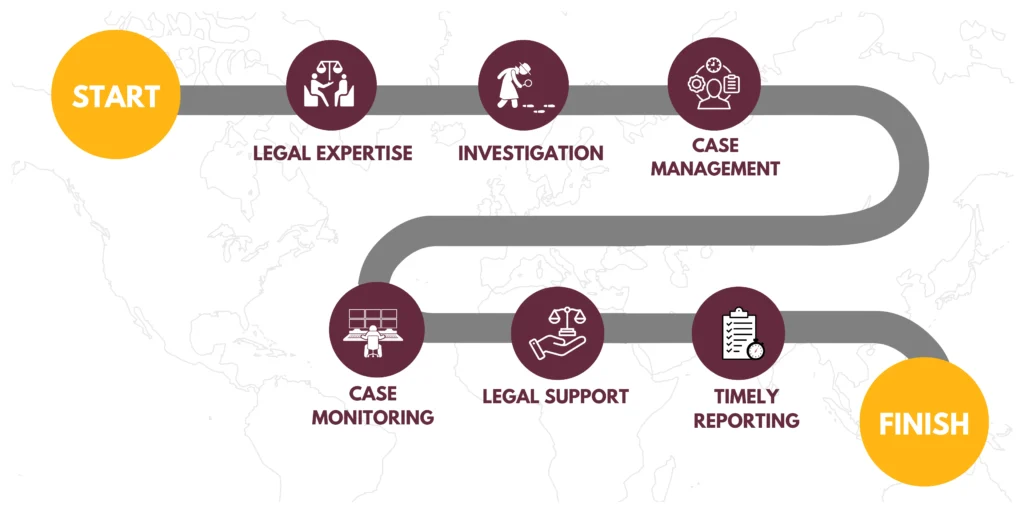Debt recovery in the UAE can be challenging for businesses facing late payments and unresolved commercial debts that impact cash flow and long-term stability. While legal action is sometimes necessary, many companies prefer amicable debt recovery to avoid costs, delays, and damaged business relationships. This guide explores practical strategies UAE businesses can use to negotiate, settle, and recover commercial debts efficiently, while staying compliant with local laws.
Amicable Commercial Debt Settlement Strategies in UAE:
Negotiating debt settlements can be a challenging yet essential process for managing financial obligations. By employing effective strategies and communication skills, we can navigate this process amicably with creditors. Here are some key tips for negotiating debt settlements:

- Understand Your Financial Situation: Before initiating negotiations, assess your financial standing and determine a realistic settlement amount that you can afford.
- Communicate Openly: Maintain open and honest communication with creditors to establish a transparent dialogue throughout the negotiation process.
- Propose a Feasible Settlement Plan: Present a well-thought-out settlement proposal that demonstrates your commitment to resolving the debt while considering both parties’ interests.
- Seek professional assistance if needed. If negotiations become complex or overwhelming, consider enlisting the help of debt recovery consultant or financial advisors to guide you through the process.
- Document Agreements: Ensure that any agreements reached during negotiations are documented in writing to avoid misunderstandings or disputes in the future.
The Importance of Communication and Documentation in Debt Recovery
- Effective communication and proper documentation play a crucial role in the debt recovery process. By maintaining clear and consistent communication with debtors, debt collectors can establish trust, convey information effectively, and negotiate repayment terms.
- Documentation is essential for recording key details of the debt recovery process, including (Payment agreements, promises made by the debtor, and any relevant communications). This documentation serves as a legal record that can be used to enforce repayment agreements if necessary.
- When writing a debt settlement letter, it is important to be clear, concise, and professional. The letter should outline the terms of the settlement offer, including:
- The amount to be paid
- Deadlines for payment
- Consequences of non-compliance.
By documenting this agreement in writing, both parties have a clear understanding of their obligations and rights in the debt settlement process.
Read more about : the role of legal settlement agencies in helping business
Legal Rights for UAE Business Creditors & Debtors
In the debt recovery process, both creditors and debtors in the UAE have legal rights that should be considered to ensure a fair and lawful procedure.
- Creditors in the UAE have legal rights that allow them to take certain actions to recover debts owed to them. These rights include following specific legal steps for debt recovery, such as sending formal demand letters and pursuing legal action through the appropriate channels.
- Debtors in the UAE also have the right to protect them during the debt recovery process. These rights include being provided with clear information about their debts, being treated fairly and respectfully by creditors, and having avenues for dispute resolution if they believe the debt is not valid.
Both parties involved in debt recovery must be aware of their legal considerations and rights to navigate the process effectively while upholding their respective obligations under UAE law.
In conclusion
Negotiation strategies such as debt restructuring, settlement agreements, or payment plans can be explored to reach a fair resolution. Seeking professional advice from financial advisors or debt management experts can also provide valuable insights on navigating the process effectively.
Ultimately, prioritizing communication, cooperation, and transparency in debt resolution efforts can lead to positive outcomes for all parties involved. By proactively addressing financial obligations through negotiation and amicable settlements, individuals in the UAE can take proactive steps towards achieving financial stability and peace of mind.
FAQs
How to settle credit card debt in UAE?
– Assess Your Debt: start by listing all your credit card debts, including outstanding balances, interest rates, and minimum payments.
– Create a Budget: Develop a budget that prioritises debt repayment. Allocate funds towards essential expenses while directing any extra income towards paying off your credit cards.
– Negotiate with the Bank: Contact your credit card providers to discuss your situation. Many banks in the UAE offer options for restructuring debt or negotiating lower interest rates or settlements.
– Consider Debt Consolidation: If you have multiple debts, consolidating them into one loan with a lower interest rate can simplify repayments and reduce monthly obligations.
How to deal with debt collectors in UAE?
You have the right to dispute any inaccuracies in your debt claim; if you believe there has been an error, communicate this clearly. It’s advisable to keep records of all communications with debt collectors for future reference. If you feel threatened or harassed, report this behavior to local authorities or seek legal advice.
What to do after court judgement in UAE?
After receiving a court judgment in the UAE, it is crucial to understand your options and the next steps. If you are satisfied with the ruling, ensure compliance by fulfilling any obligations outlined in the judgment, such as paying fines or adhering to custody arrangements. However, if you disagree with the decision, you have the right to appeal within a specified timeframe.
What happens if you leave the UAE with debt?
Leaving the UAE with outstanding debt can lead to serious consequences. If you have unpaid loans or credit card debts, creditors may file a case against you, which could result in a travel ban being imposed. This means that if you attempt to leave the country, immigration authorities may stop you at the airport. Additionally, your name could be blacklisted in the UAE, making it difficult to return or conduct any business activities in the future.
Can banks in Dubai go after you in your home country for unpaid debts in the UAE?
Yes, banks in Dubai can pursue you for unpaid debts even if you are back in your home country. While the process can be complicated and varies depending on international agreements and local laws, banks often engage collection agencies or legal representatives to recover debts across borders. If a bank has obtained a court judgment in the UAE, they may seek to enforce it in your home country through local courts, depending on the legal framework that exists between the two nations.
Can i leave UAE with credit card debt?
Yes, you can leave the UAE with credit card debt, but it is not advisable. While there are no exit bans specifically for unpaid credit card debts, banks may take legal action against you if you default on payments. This could lead to complications if you plan to return to the UAE or travel elsewhere in the region.
Can you be stopped at airport for debt in UAE?
Yes, you can be stopped at the airport in the UAE due to debt. The UAE has strict laws regarding financial obligations, and if you have outstanding debts or unpaid loans, creditors can file a travel ban against you. This means that when you attempt to leave the country, immigration authorities may prevent your departure until the debt is settled.
Is it illegal for a collection agency to buy your debt and come after you?
It is not illegal for a collection agency to buy your debt and pursue repayment. In fact, this is a common practice in the financial industry. When you fail to pay a debt, creditors may sell it to collection agencies, which then have the legal right to collect on that debt. However, they must adhere to regulations set out by laws and depend on which the country you are based on legalize selling and purchasing debt or not.
What happens if you don't pay cash now?
If you don’t pay cash now, several consequences can arise depending on the context. For instance, if you’re dealing with a purchase or service that requires immediate payment, failing to pay could result in losing the opportunity altogether. In financial agreements, such as loans or bills, not paying on time may lead to late fees, increased interest rates, or damage to your credit score. Additionally, in some cases, non-payment can escalate to legal action or debt collection efforts.
What happens if you don't pay credit card debt?
As time goes on without payment, the creditor may escalate their collection efforts, potentially involving third-party debt collectors. In extreme cases, if the debt remains unpaid for a prolonged period, it could lead to legal action where creditors might sue you for the amount owed.
 AW Holding
AW Holding
















